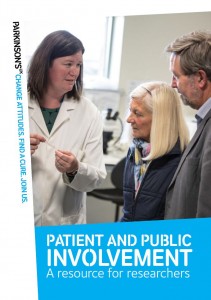Parkinson’s UK have developed a new resource for researchers to help support them to engage with and involve people with Parkinson’s in their research in a meaningful way. The booklet was developed as a result of feedback from researchers who wanted support to understand what Patient and Public Involvement (PPI) means and how they can ensure its effectiveness in their work. While the toolkit has been developed by Parkinson’s UK, it has been designed to be applicable to different areas of research too.
The toolkit is available here. The booklet is a great resource and supports our existing PPI work, so we’d encourage you to take a look.
How does BU support Patient and Public Involvement?
Involving patients and members of the public in research is essential to ensure that our research remains relevant, acceptable and appropriate to those it aims to benefit.
Patient and public involvement (PPI) in research, both pre- and post-award, can add value to the research as patients are often the real experts on a condition they either live with or have experienced. For example, pre-award, patient and public views can inform the appropriateness of a research question, the recruitment strategy, outcome measures and dissemination plans for a research project. Once a project is funded, on-going PPI can help advise the research team on any challenges as it is delivered e.g. recruitment targets not being met.
Involving patients and the public in research is now mandatory for all National Institute for Health Research (NIHR) funding programmes, and an increasing importance is being placed on PPI by other funding bodies. Helen Allen, PPI lead in the Bournemouth University Clinical Research Unit (BUCRU) provides support and advice regarding how best to involve patients and the public both pre-award and throughout the delivery of a research project.
As examples, in BUCRU we have conducted PPI activities with:
- People with ankle fractures to determine whether a plaster cast or boot is the most effective treatment (the PPI in this funded project was commended by the reviewers on the funding panel)
- People with osteoarthritis of the hip in the effectiveness of cycling to help improve hip function and decrease pain (we have published a paper on this activity and an associated poster was highlighted as a good learning tool by the NIHR Director for Patient and Public Involvement)
- People with skin cancer on a project relating to self-management of skin examination
- Pregnant women and the potential use of aromatherapy in labour
- Within the Faculty of Health and Social Sciences, Bournemouth University hosts a Service User and Carer Partnership of 80 members, who have a wide range of experiences of Health and Social Care services. This group can be used as a resource to help shape research; advise on lay summaries and contribute to focus groups

 Free Patient and Public Involvement training for Parkinson’s researchers
Free Patient and Public Involvement training for Parkinson’s researchers Supporting patient and public involvement in research
Supporting patient and public involvement in research Introduction to Patient and Public Involvement (PPI) for Researchers – free event
Introduction to Patient and Public Involvement (PPI) for Researchers – free event Good public involvement in research – the perspective of a patient advocate
Good public involvement in research – the perspective of a patient advocate










 ESRC Festival of Social Science 2025 – Reflecting back and looking ahead to 2026
ESRC Festival of Social Science 2025 – Reflecting back and looking ahead to 2026 3C Event: Research Culture, Community & Cookies – Tuesday 13 January 10-11am
3C Event: Research Culture, Community & Cookies – Tuesday 13 January 10-11am Dr. Chloe Casey on Sky News
Dr. Chloe Casey on Sky News Final Bournemouth University publication of 2025
Final Bournemouth University publication of 2025 On Christmas Day in the Morning…
On Christmas Day in the Morning… ECR Funding Open Call: Research Culture & Community Grant – Application Deadline Friday 12 December
ECR Funding Open Call: Research Culture & Community Grant – Application Deadline Friday 12 December MSCA Postdoctoral Fellowships 2025 Call
MSCA Postdoctoral Fellowships 2025 Call ERC Advanced Grant 2025 Webinar
ERC Advanced Grant 2025 Webinar Horizon Europe Work Programme 2025 Published
Horizon Europe Work Programme 2025 Published Update on UKRO services
Update on UKRO services European research project exploring use of ‘virtual twins’ to better manage metabolic associated fatty liver disease
European research project exploring use of ‘virtual twins’ to better manage metabolic associated fatty liver disease